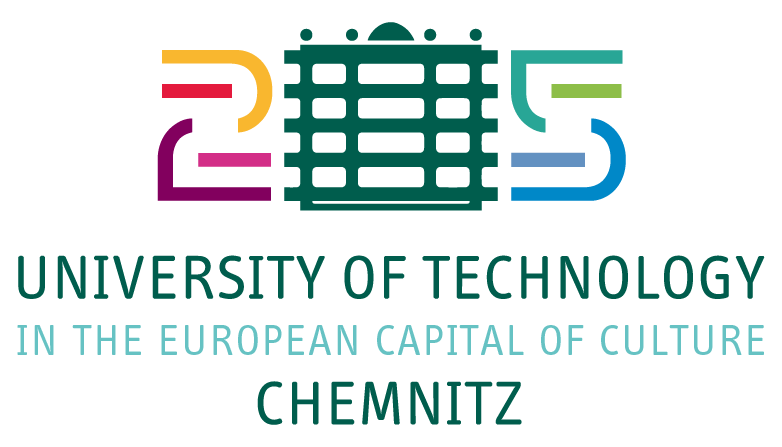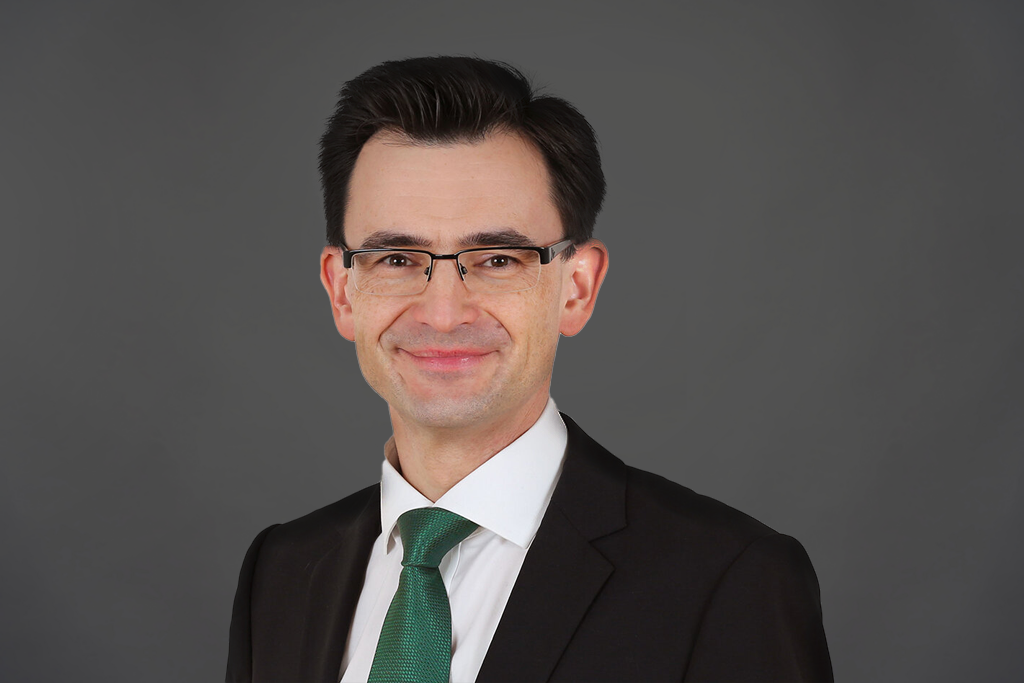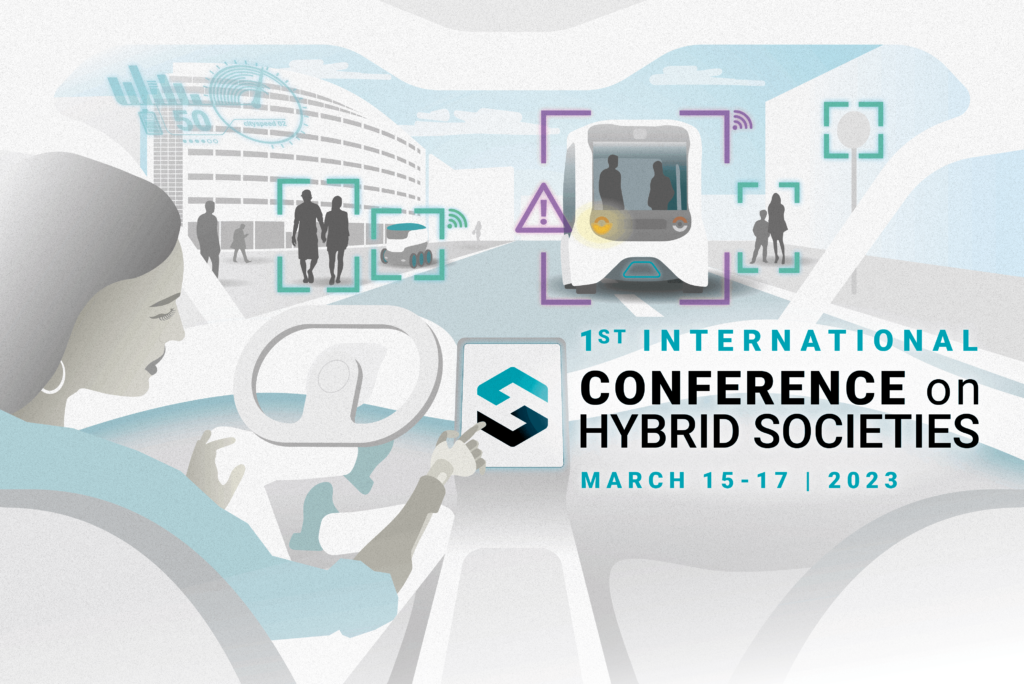
Call for Papers
In hybrid societies, humans and embodied technologies need to coordinate efficiently. Hybrid societies arise when embodied digital technologies functioning as artificial agents mingle with humans in public environments. Imminent examples of embodied technologies interacting with humans in public environments are highly automated and driverless vehicles mixed with human-driven vehicles and human road-users in traffic as well as urban robots for street-cleaning, service, or delivery. Coordination of humans with fellow humans in public environments is relatively smooth. For interactions in hybrid societies to be effective and similarly smooth, human capabilities and technological functionalities must be analyzed and harmonized in novel ways.
Coordination in hybrid societies involves perceiving and tracking behavior, assessing each other’s capabilities, states, and situation-specific intentions in encounters for prediction, implicit and explicit communication, and movement planning and control. Coordination can be studied at the level of individual encounters and human-machine interfaces up to the level of whole socio-technical systems encompassing joint activities of human and artificial agents.
The first international Conference on Hybrid Societies is organized by the DFG-funded Collaborative Research Center Hybrid Societies at Chemnitz University of Technology (CRC 1410 Hybrid Societies funded by the German Research Foundation), in which a highly interdisciplinary group of researchers from psychology and engineering sciences to mathematics and computer science to the social sciences and humanities address the challenges of shaping the coexistence of humans and machines in public environments. For Hybrid Societies 2023, we invite contributions that report original novel research findings on human-machine interaction in hybrid societies and contributions that advance required technological innovations including AR/VR technologies for embodiment and simulation. The conference is single-track. The final program will be the result of a selective peer-review process based on the quality, originality, and relevance of submissions and will include presentations of refereed papers and keynote talks. A Best Paper Award will be provided to the most outstanding contributions by a committee of experts. The conference proceedings will be published in a peer-reviewed book by Springer and a selection of extended contributions will be invited to be submitted to special issues in renowned international scientific journals.
Examples of topics
Socio-technical systems with embodied digital agents
- coordination of humans and embodied digital technologies
- automated driving and urban robotics
- smoothly resolving space-sharing conflicts
- coordination of joint actions
- shared intentionality
- adaptive autonomy and coactive design
- cooperation and trust in first encounters
- acceptance, credibility, and (legal) responsibility of artificial agents
- framing and modulating interaction
- cultural differences
- resilience engineering of joint cognitive systems
Perceiving and assessing interaction partners
- human behavior tracking
- recognition and displays of gaze, gestures, and postures
- assessing capabilities
- social perception
- anthropomorphism, zoomorphism
- human-like behavior and movement styles
- adaptive interaction
Predicting behavior for joint action
- recognizing and predicting intentions
- joint attention
- epistemic modeling
- theory of mind
- action prediction
- dynamic coupling
Interaction for coordination
- implicit communication
- multimodal communication
- language for coordination and repair
Motion tracking and control
- body-attached sensors and actuators
- sensory feedback
- haptic feedback
- teleoperation and telemanipulation
- shared autonomy
- spatial orientation, telepresence, and spatial updating
- interaction with teleoperators
News
Keynotes
Tal Oron-Gilad, Ben-Gurion Universtity of the Negev
Socializing with Autonomous Systems: Human Expectations and Needs
Socializing with autonomous systems is a relatively new and evolving field, and there is still much to learn about human expectations and needs when it comes to interacting with autonomous systems, as those become more prevalent in our daily lives and aim to fulfill many different roles in different domains. There are certain commonalities in what people expect autonomous systems to do (e.g., communicate, convey intent clearly and understand intent, respond) or be (e.g., trustworthy, transparent, and for some contexts also be polite or empathetic). Still, there are also many differences in expectations and needs. In this lecture, I will argue that the key to successful implementations lies in addressing autonomy levels, adaptivity, and control (e.g., who decides, when, and what). I will present an autonomy framework consisting of four components (Human-Automation/AI/Robot-Task-Environment) and showcase research examples from social assistive robotics and autonomous vehicles.
Matthew Johnson, Florida Institute For Human & Machine Cognition
What it means to work together
The goal of hybrid societies should be more than peaceful coexistence. To reach its maximum benefit, humans and artificial agents in hybrid societies need to work together. While this is simple and intuitive conceptual, the challenge is grounding this out in practice. Human language has a wide range of words used to describe working together, such as coordination, teamwork, collaboration, and cooperation. However, these terms are too high level to provide designers and builders of systems adequate guidance. This talk will explore what it means to work together and how we might ground the high level conceptual goals into tangible grounded technological solutions.
Gustav Markkula, University of Leeds
Designing Tomorrow’s Hybrid Societies for Yesterday’s Human Brain
In the shift toward hybrid societies, where humans increasingly coexist with digital embodied technologies such as robots and automated vehicles, we need to ensure that humans actually stand to gain from these developments. In this talk, I argue that development of human-friendly hybrid societies requires an understanding and models of human behaviour, and the preferences, limitations, and mechanisms underpinning it. Specifically, I will discuss how work of this nature can benefit from acknowledging that humans, and not least their brains, are the result of biological evolution. Through this lens, I will review selected recent work by our research group and others, and discuss some ways in which we humans are much like other animals—and like robots—and other ways in which we are not.
Pre-Conference Workshops
Build-your-own EDT Hackathon
Important Dates
When: March 14, 2023
Where: Chemnitz University of Technology – Central Lecture Hall Building "Orangerie"
Embodied digital technologies are increasingly prevalent, even in public spaces. We encounter non-human agents that serve as teleconference avatars, delivery drones, and even in our own households, vacuum cleaners that can find their way around. How do they sense the environment? How do they "know" what to do and how to carry out these plans? More importantly, how can their behavior be designed that they are not merely automated behavior with physical bodies but co-agents in shared environments, whose agency we accept as we go about our daily business.
The goal of this one-day hackathon is to help us better understand how EDTs function and to co-create the culture of tomorrow's hybrid societies. We invite you to join us for a one-day hackathon!
What awaits you
In this Hackathon, you will gain first-hand experience with the building blocks of EDTs (i.e., sensors, actuators, and a controller) and learn how to make these components work together. In teams, you will design, build, and program robots that will be readily accepted as a member of our everyday lives. Through the process of developing EDTs, we will discuss the requirements of such an EDT, accordingly to our diverse perspectives, individual preferences, and personal motivations.
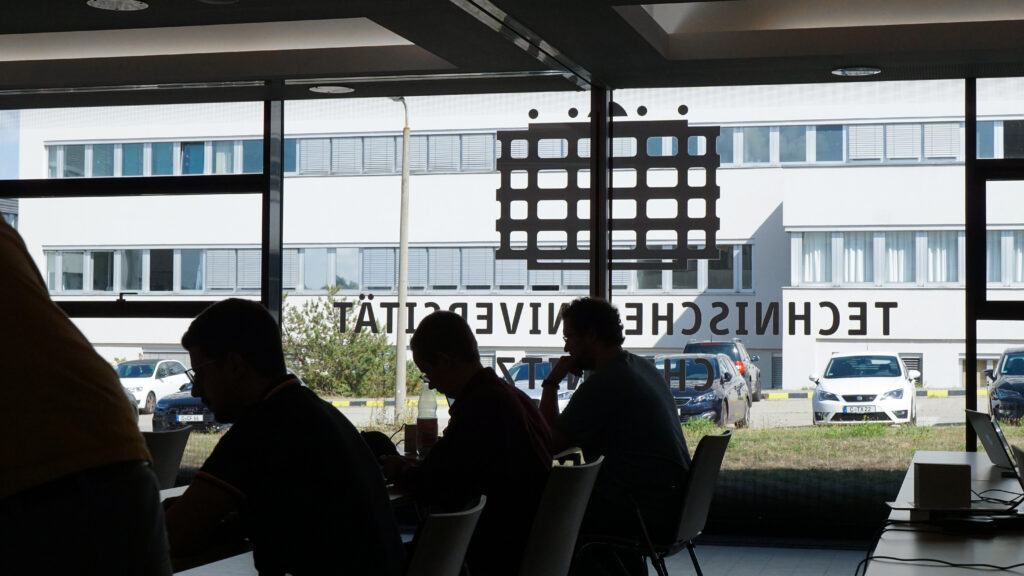
Photo: Larissa Flade
Prerequisites
No prior knowledge on programming or robotics is necessary. This event is designed to challenge your creativity and problem-solving skills to encourage critical thinking about so-called smart technology that is populating our society. Our development platform will be SPIKE, Lego's interactive development kit.
Registration Procedures
This event is free for conference registrants as long as there are places available. Priority will be given to early career researchers.
Contact Person
Max Kullmann: maximilian.kullmann@phil.tu-chemnitz.de
Support
Jayanto Halim (Fraunhofer Institute for Machine Tools and Forming Technology IWU, Chemnitz)
Recommended Reading:
Gilbert, M. (1990). Walking together: A paradigmatic social phenomenon. MidWest studies in philosophy, 15, 1-14.
Seethaler, R. (2012). Der Trafikant. Kein & Aber AG, Zürich.
Joint Colloquium on Virtual Testing and Digital Twins
Important Dates
When: March 14, 2023
Where: Chemnitz University of Technology – Central Lecture Hall Building "Orangerie"
The colloquium is a pre-conference event of the CRC conference, organized in the framework of the Young Scientists Lecture Series.
Speakers from the Fraunhofer JL IDEAS, of the University of Naples Federico II and from the CRC Hybrid Societies will give talks on the topics of Virtual Testing and Digital Twins.
Preliminary program
- 8:30 - 9:00
Welcome and introduction - 9:00 - 10:15
Virtual and Augmented Reality for Design, Ergonomics and Training
Prof. Dr.-Ing. Giuseppe Di Gironimo & M.Eng. Sara Buonocore
Fraunhofer JL IDEAS, Dept. of Industrial Engineering, University of Naples Federico II - 10:15 - 10:30
Coffee break - 10:30 - 11:30
Using Virtual Reality to Study Human Behavior
M.Sc. Sascha Feder Cognitive Systems Lab (SFKS), Chemnitz University of Technology - 11:30 - 12:15
Studying Social Perception of Embodied Digital Technologies in Augmented Reality
M.Sc. Carsten Rudolph
Professorship of Computer Graphics and Visualization, Chemnitz University of Technology - 12:15 - 13:15
Lunch break at TU Campus Mensa - 13:15 - 14:15
A MBSE Approach for the Digital Twin Implementation of Mechatronic Systems
Dr.-Ing. Andrea Rega
Fraunhofer JL IDEAS, Dept. of Industrial Engineering, University of Naples Federico II - 14:15 - 14:30
Coffee break - 14:30 - 15:15
Virtual Testing for the Assessment of Wearable Sensor Networks for Gesture Recognition
M.Eng. Giuseppe Sanseverino
Department of Sports Equipment and Technology, Chemnitz University of Technology
Blanc
Contact person
Giuseppe Sanseverino: giuseppe.sanseverino@mb.tu-chemnitz.de
Program
During a session, all talks will have a duration of 10 minutes and will be followed by a discussion of 5 minutes.
Pre-conference-Tuesday | March 14, 2023
Two parallel planned Pre-Conference Workshops at the Orangerie (ZHS, C10) :
- Hackathon from the Fachgruppe Ingenieurpsychologie
- Joint colloquium on Virtual Testing and Digital Twins
- 10:00 - 17:00
Pre-registration
Day 1 - Wednesday | March 15, 2023
- 7:30 - 8:30
Registration - 8:30 - 9:00
Welcome - 9:00 - 10:30
Special Symposium on "Highly Automated Transport Systems - Part I" - 10:30 - 11:00
Coffee Break with (Poster Session / Demos / Exhibition/ Results From the Pre-Conference Workshops) - 11:00 - 12:00
Keynote Matthew Johnson "What it Means to Work Together" - 12:00 - 13:00
Session 1 - Wearable Sensors & EDTs - 13:00 - 14:00
Lunch break - 14:00 - 15:00
Session 2 - Artificial Intelligence & Machine Learning Part 1 - 15:00 - 15:15
Short Coffee Break - 15:15 - 16:15
Session 3 - Social Perception & Anthropomorphisation Part 1 - 16:15 - 16:45
Coffee Break with (Poster Session / Demos / Exhibition/ Results From the Pre-Conference Workshops) - 16:45 - 17:45
Session 4 - Research Environments & Methods
Day 2 - Thursday | March 16, 2023
- 8:30 - 9:00
Session 1 - Robotics & Teleoperation Part 1 - 9:00 - 10:30
Special Symposium on "Highly Automated Transport Systems - Part II" - 10:30 - 11:00
Coffee Break with (Poster Session / Demos / Exhibition/ Results From the Pre-Conference Workshops) - 11:00 - 12:00
Keynote Tal Oron-Gilad "Socializing with Autonomous Systems: Human Expectations and Needs" - 12:00 - 13:00
Session 2 - Autonomous Vehicle & Urban Robotics Part 1 - 13:00 - 14:00
Lunch break - 14:00 - 15:00
Session 3 - Motion Tracking & Prediction Part 1 - 15:00 - 15:15
Short Coffee Break - 15:15 - 16:00
Session 4 - Social Perception & Anthropomorphisation Part 2 - 16:00 - 16:15
Short Coffee Break - 16:15 - 17:15
Session 5 - Robotics & Teleoperation Part 2 - 19:00 - 22:00
Conference Dinner
Venue:
Wirkbau - Halle G
Annaberger Str. 73
09111 Chemnitz
Day 3 - Friday | March 17, 2023
- 8:30 - 9:30
Session 1 - Artificial Intelligence & Machine Learning Part 2 - 9:30 - 9:45
Short Coffee Break - 9:45 - 10:45
Session 2 - Motion Tracking & Prediction Part 2 - 10:45 - 11:00
Short Coffee Break - 11:00 - 12:00
Keynote Gustav Markkula "Designing Tomorrow’s Hybrid Societies for Yesterday’s Human Brain" - 12:00 - 13:00
Session 3 - Autonomous Vehicles & Urban Robotics Part 2 - 13:00 - 14:00
Lunch break - 14:00 - 14:45
Session 4 - Communication & Multimodality - 14:45 - 15:00
Short Coffee Break - 15:00 - 15:45
Session 5 - Virtual Reality & Eye-gaze - 15:45 - 16:15
Best Paper Award and Closing Session - 16:15
Coffee Break & Farewell
Dates and Submissions
Submissions for oral presentations presenting original and unpublished work are solicited on all topics of hybrid societies. Authors may choose to submit in either one of two ways.
- For inclusion in an edited volume (Springer): papers submitted for inclusion in a peer reviewed publication should be 5-6 pages in length. If accepted, reviewer comments will be sent to allow for revision for publication.
- Short papers not aimed at book publication should not exceed 1,200 words (including figures, tables, and references; excluding title and abstract). Some short paper submissions may be accepted for poster presentation.
All submissions must be written in English, formatted according to our template which is available below.
All submissions will be reviewed by the Program Committee. Accepted submissions must be presented at the conference (at least one author of each submission must register to be included in the program).
Proceedings will be indexed in WoS and SCOPUS.
All submissions must be made electronically through the online submission system ConfTool. To make sure that your paper meets the formal requirements, please use the following templates. Please note: The final format will be defined and realized by the publisher at a later date. The templates below are valid for the review procedure for the time being. Hence, the limit of 6 pages applies only to the Word template. If you are working with the LaTex template, please submit a maximum of 12 pages.
Important Dates
Submission deadline: September 1, 2022
Notification of acceptance: October 24, 2022
Final camera-ready submission: December 15, 2022
Registration
Registration fees
normal fee
Early bird (until December 15, 2022)
250€
Regular (from December 16, 2022 until February 28, 2023)
300€
discounted fee
Early bird (until December 15, 2022)
175€
Regular (from December 16, 2022 until February 28, 2023)
225€
The conference fee includes the Conference Dinner.
Venue
Chemnitz University of Technology
The conference will take place in the Central Lecture Hall Building "Orangerie" of the Chemnitz University of Technology.
Address:
Chemnitz University of Technology
Reichenhainer Str. 90
09126 Chemnitz, Germany
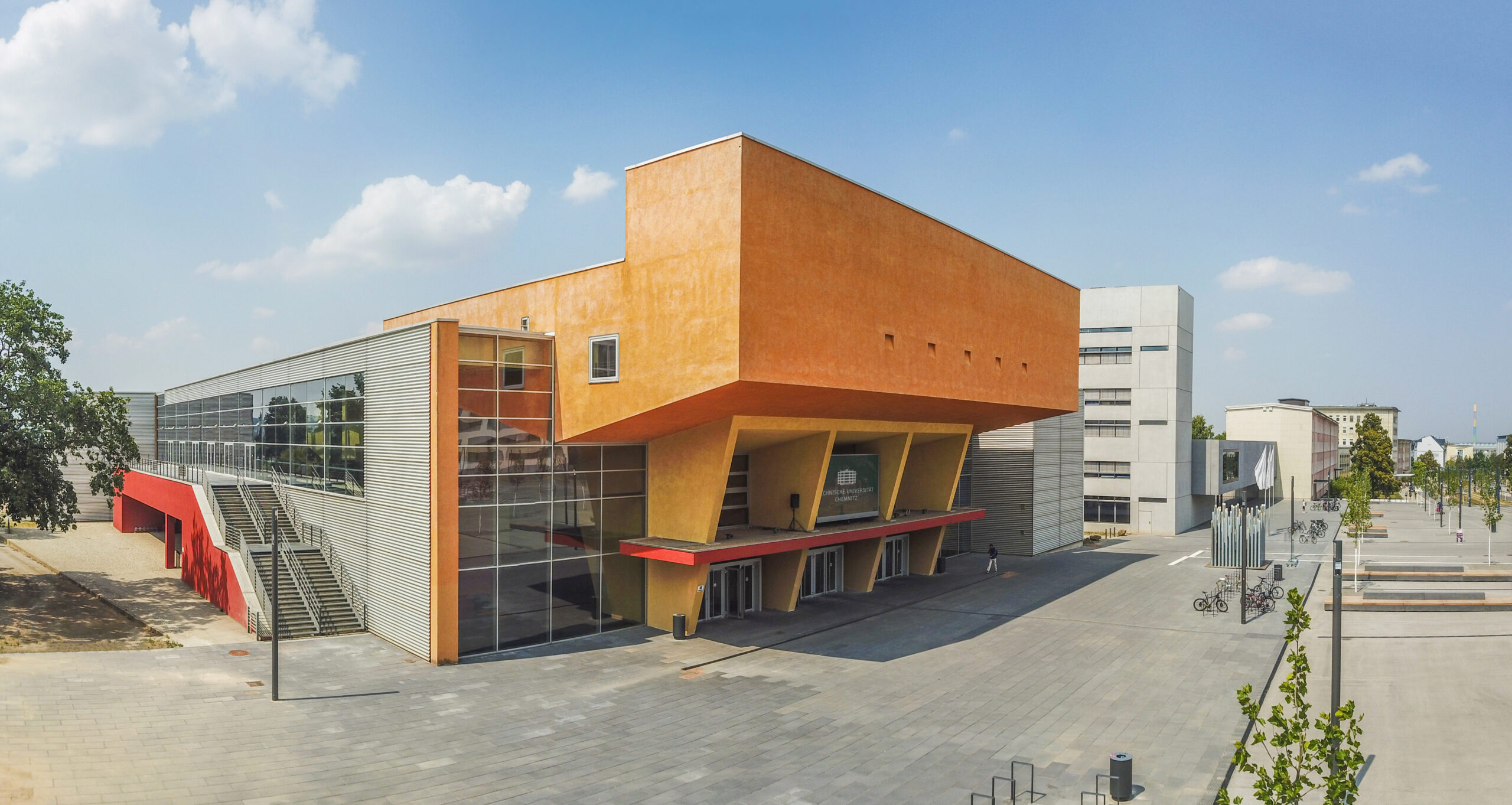
Suggestions for accommodation:
- Hotel an der Oper
https://www.hoteloper-chemnitz.de/de/
Straße der Nationen 56
09111 Chemnitz
Tel:: 0371-681 0
info@hoteloper-chemnitz.de
a limited amount of rooms is reserved under the code: TU Chemnitz CRC Conference
EZ: 75€ - Biendo Hotel Chemnitz
https://www.biendo-hotel.de/
Straße der Nationen 12
09111 Chemnitz
Tel.: 0371-4331920
info@biendo-hotel.de
a limited amount of rooms is reserved under the code: 211759
EZ: 59,90€ - Seaside Residenz Hotel Chemnitz
https://www.residenzhotelchemnitz.de/
Bernsdorfer Straße 2
09126 Chemnitz
Tel.: 0371 - 355 10
info@residenzhotelchemnitz.de
a limited amount of rooms is reserved - Super8 by Wyndham
https://www.wyndhamhotels.com/de-de
Stefan Heym Platz 3
09111 Chemnitz
Tel.: 0371 9128970
EZ: 59,10€ - Dorint Kongresshotel
https://dorint.com/de/
Brückenstr. 19
09111 Chemnitz
Tel.: 0371 6830
EZ: 59€
Organization

Program Chair
Program Committee
CRC Project Leaders and PostDocs
Prof. Dr. Abdulmotaleb El Saddik
Contact
conference@hybrid-societies.org
Postal address:
CRC Hybrid Societies
Chemnitz University of Technology
Reichenhainer Str. 70
09126 Chemnitz, Germany
Sponsors and supporting organizations

